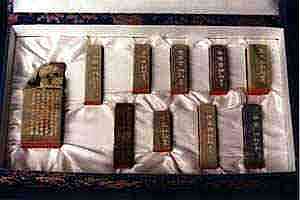
 Wing-Chun Kuen Kuit - Wing-Chun Words of Wisdom
Wing-Chun Kuen Kuit - Wing-Chun Words of Wisdom
Wing Chun Kuen Kuit are "Words of Wisdom" which capture in poetic terms the finer attributes of Wing Chun Kung Fu. "Kuen Kuit" is Cantonese for "martial sayings" or "fighting songs." Chinese martial arts employ Kuen Kuit as concise, rhythmic verses which present a method or philosophy of a style. Even among competing Wing Chun traditions, many sayings are recognized and shared. One significant proverb cites, "Loy Lau Hoi Sung, Lut Sau Jik Chung." This means: "Retain what's coming in; Send off what's retreating; Rush in upon loss of hand contact." Regardless of the Wing Chun tradition, this advice bridges many differences and defines one of the most important strategies of the art.
The original Wing Chun Kuen Kuit are believed to descended from an ancient, oral tradition, and reportedly were connected to southern Chinese secret societies of the nineteenth century. Moy Yat wrote, "It was during the ching dynasty that many of the proverbs were part of secret codes and rituals developed by the rebels dedicated to overthrowing the Manchus." Over the passing years, unrelated or inapplicable sayings were eventually discarded, the remaining few are described as being "truly intrinsic" to Wing Chun Kung Fu.
"Wing Chun Chuen Jing Tung" is an important proverb usually displayed in the traditional Wing Chun school. This refers to the genuineness of the martial art and reads, "Wing Chun authentically passing down." This means passing on the true system of Wing Chun "unchanged by your own ideas." Other well known proverbs cite: Kuen Yau Sum Faat (The punch starts from the heart); Ying Da Juck Da, But Ying Da, But Ho Da ... (Strike when you should, Do not strike when you should not ...); Chew Ying Joi Ying (Face toward and chase the opponent); Chum Jong Sau Jone (Sink the elbow, protect the center)4; Guan Mo Leung Heung (The staff doesn't make two sounds), etc..gif)
Wing Chun's Traditional Rules of Conduct and the popular sayings above may be easily recognized. Others have been preserved based upon the discretion of Augustine Fong. There are maxims, training proverbs and sayings for all Wing Chun forms. The majority of these are genuine, artistic commentaries on Wing Chun boxing. It may be noticed some verses are similar to training proverbs presented in the Chinese Internal Arts. Thus, "People do not know the extent of my skills, but I know their abilities," has been attributed to Yang Lew-Shan: "The theory of Tai-Chi is that nobody knows you, only you know them." This is a popular saying, as are those which mention invisible techniques such as the famed Mo Ying Gerk (No Shadow kick).
While masters of self-defense declare that real experience is the best teacher, Wing Chun proverbs do excel as wonderful reminders and clues to the mastery of the martial art. These poetic stanzas preserve a secret Kung Fu tradition, a legacy which can be rendered in beautiful Chinese calligraphy. Wing Chun Kuen Kuit are treasures waiting to be discovered; they remain an outstanding contribution to the world of Chinese martial arts.